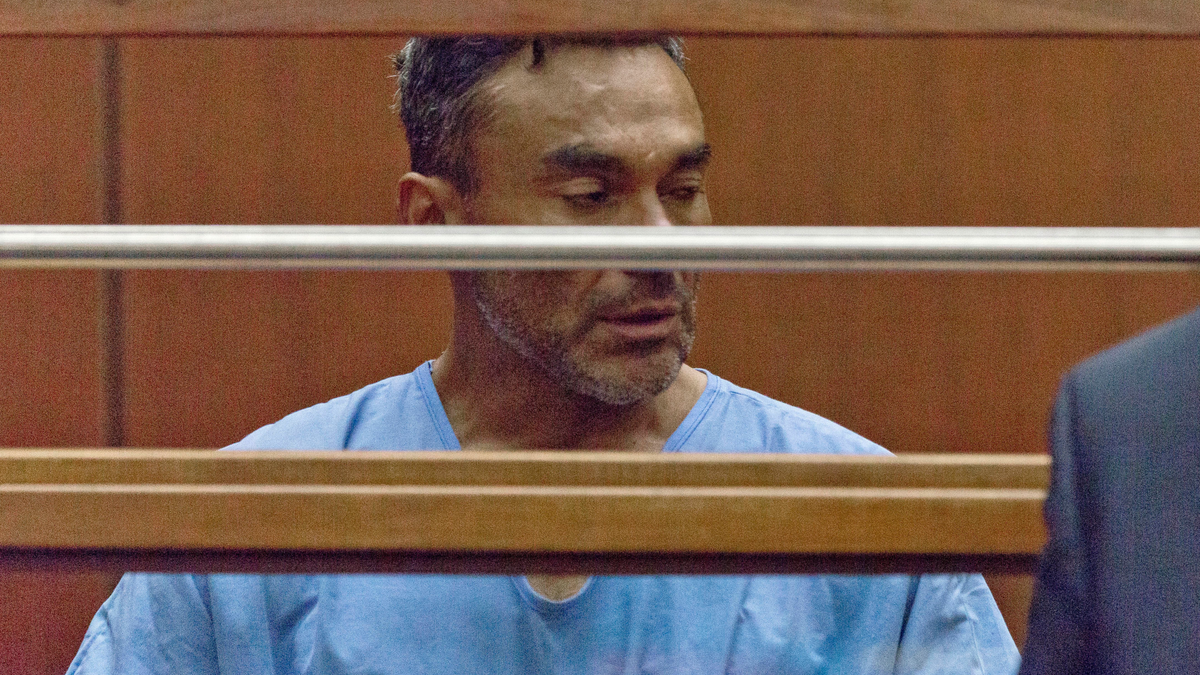Judge reverses order barring court photos of murder suspect
{{#rendered}} {{/rendered}}
ADDS REVERSAL OF JUDGE'S ORIGINAL ORDER BANNING PUBLICATION WEDNESDAY - In this Wednesday, Sept. 26, 2018 photo, Ramon Alberto Escobar, with an unidentified attorney, appears at a hearing in Los Angeles County Superior Court. Escobar was charged with three counts of murder, five counts of attempted murder and four counts of second-degree robbery in attacks involving homeless men in Los Angeles and Santa Monica, Calif. The photo could not be published Wednesday because Judge Gustavo Sztraicher, after at first permitting photography, ordered recording stopped after it had begun. Sztraicher reversed the order Thursday, Sept. 27, after the Associated Press and Los Angeles Times successfully challenged his order as an unconstitutional intrusion on free speech. (AP Photo Damian Dovarganes)
A Los Angeles judge on Thursday reversed an order barring journalists from publishing courtroom photographs of a Texas man charged with beating to death three men in Southern California.
The Associated Press and the Los Angeles Times successfully challenged Superior Court Judge Gustavo Sztraicher's order as an unconstitutional intrusion on free speech.
Sztraicher on Wednesday ordered reporters to stop filming and photographing when an attorney for Ramon Escobar objected.
{{#rendered}} {{/rendered}}Dan Laidman, who represented the Times and AP, argued that higher courts have struck down prior restraint orders limiting coverage of criminal proceedings. Besides, Laidman said, media outlets had already published photographs of Escobar, who is charged in three killings and five other assaults of men sleeping outside in Los Angeles County this month.
Laidman added that the journalists took photos a day earlier after getting the judge's blessing.
Deputy Public Defender Jennifer Friedman argued Thursday that photos and video taken of Escobar a day earlier were unlawful because the judge hadn't signed a written copy of a media request to record the proceeding.
{{#rendered}} {{/rendered}}Friedman also said she worried that the photos could taint testimony of potential witnesses.
During Wednesday's hearing, Sztraicher initially told journalists he had approved a request to photograph. But as journalists began shooting, Escobar's attorney objected, telling the judge it could cause an "identification issue." Sztraicher then ordered the journalists to stop photographing the proceeding and also told a sketch artist to stop drawing.
David Snyder, executive director of the First Amendment Coalition, hailed the judge's decision to vacate his order.
{{#rendered}} {{/rendered}}"The order should never have been issued in the first place," he said. "I'm glad the court saw the light of day."
Defense attorneys frequently argue that publishing their client's image before trial could improperly sway witnesses, Snyder said, and state court judges in California have broad discretion over whether photography is allowed in their courtrooms. Once photographs have been taken legally, however, "the toothpaste is out of the tube and the court cannot prevent them from being disseminated," he added.
Investigators believe that Escobar, 47, bludgeoned his victims as they slept on the beach or on the streets in order to rob them. He was ordered held without bail pending a Nov. 8 arraignment.
{{#rendered}} {{/rendered}}Police in Houston want to interview Escobar in the disappearance last month of his aunt and uncle.
The El Salvador-native has a long criminal history, including six felony convictions for burglary and illegal re-entry, but U.S. Immigration and Customs Enforcement released him from custody after Escobar won an appeal in immigration court in 2016.
___
{{#rendered}} {{/rendered}}Associated Press writers Elliot Spagat in San Diego and David Warren in Dallas contributed.
Follow Weber at https://twitter.com/WeberCM .
